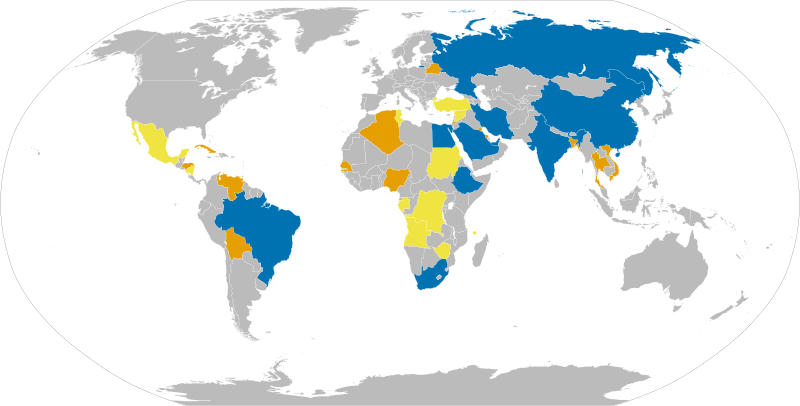Sputnik interviewed UWI author Mehmet Perinçek on BRICS. In the interview Mehmet Perinçek shared his views on the expansion of BRICS, possibility of Türkiye joining the organization, joint currency project of the organization, the need for a “central strategy” and that BRICS could be an alternative also for Europe.
UWI translated the interview, including the introductory part of Sputnik, from Turkish into English.
2023’s early days witnessed significant developments concerning BRICS, one of the most important instruments of the multipolar world. With the inclusion of Iran and Saudi Arabia, the number of member countries has reached 10.
BRICS, which already represents nearly half of the world’s population, has managed to bring together countries such as Egypt and Ethiopia which have been strained due to the dam issue for over a decade. Similarly, it now officially includes Iran and Saudi Arabia, two countries that have been on opposing sides in intense conflicts in West Asia for many years.
Among the countries willing to join BRICS are many nations, such as Bahrain, Bangladesh, Belarus, Algeria, Indonesia, Morocco, Honduras, Kuwait, Cuba, Mexico, Nigeria, Syria, Tajikistan, Thailand, Tunisia, Vietnam and Greece.
Well, what about Türkiye? Is Türkiye close to joining BRICS? The expanding alliance poses an important option for Türkiye as well.
On July 27, 2018, President Recep Tayyip Erdoğan participated in the 10th BRICS Summit held in Johannesburg, South Africa, with a special status as President of the Organization of Islamic Cooperation.
Türkiye, invited to BRICS by Russian President Vladimir Putin, had given the green light to this invitation at the time. President Erdoğan had stated that Türkiye should be included in BRICS. The question of when Türkiye’s official membership process will begin remains a matter of curiosity.
“Multipolar world will solidify in 2024”
Positive developments have been unfolding since the early days of 2024. So, what will be the role of BRICS in the near future in the multipolar world order?
Historian Mehmet Perinçek shared his views on the past and possible future of BRICS with Sputnik. Perinçek, pointing to the increasing importance of the expanding BRICS, stated, “One of the most important facts that 2023 has shown us is that a multipolar world has solidified. We see that this trend will strengthen even more in 2024. As a multipolar world is being established, its means and organizations are also manifesting themselves on the international stage. The Shanghai Cooperation Organization and BRICS are the most important examples of this. Especially the expansion of BRICS in recent times and the demands for even more participation clearly demonstrate this.”
“BRICS not having colonial motives is like a hope for countries suffering from the West”
Perinçek continued his remarks stating, “The transformation of BRICS into a relationship of equals and not having colonial motives towards countries outside of BRICS, unlike the Western Bloc, have rendered BRICS a focal point. In fact, for countries whose interests are eliminated in the face of the Western Bloc or who suffer from Western plans, BRICS has become like a hope. Especially with the recent expansion, BRICS has become a significant power in West Asia. The participation of Gulf countries is crucial.”
“BRICS is growing in West Asia”
Perinçek pointed out that the participation of Iran and Egypt has strengthened the role of BRICS in West Asia, stating, “When we look at these expansions, we see that even enemies reconcile within BRICS. BRICS brings together countries that have problems with each other side by side, for the same goals. There are serious problems between Egypt and Ethiopia due to the Renaissance Dam. The coming together of Iran and Saudi Arabia in BRICS actually shows us how regional issues can be resolved. When countries come together against the plans of the Western bloc and prevent Western intervention, it presents a good example in the resolution of regional issues.”
“BRICS has become a must for Türkiye”
Highlighting the significance of West Asia becoming a “center” for BRICS, Perinçek said, “This offers important perspectives for Türkiye as well. Türkiye remaining outside of this would mean staying distant from developments in West Asia and the world more broadly, and missing out on some crucial opportunities. In this regard, in the upcoming period, BRICS is not just an alternative for Türkiye, but also a must. Because Türkiye has the potential within BRICS to overcome the threats and economic challenges it faces.”
“BRICS joint currency project is crucial against the threats of dollar hegemony”
Perinçek, emphasizing that BRICS provides significant economic opportunities, ensures the national security of countries, and stands out as a tool for solving regional issues, made the following assessments:
“Moreover, BRICS countries possess significant underground resources and have large economies. These countries show us an array of international alliances that do not rely on the international exploitation system. On the contrary, it presents an alternative way to overcome economic threats coming from the West. One of the things that BRICS perhaps needs to address first, and one of the well-known projects, is the creation of a common currency. The dollar hegemony of the US threatens both the national security and national economies. In terms of balancing this and creating an alternative, the joint currency project of BRICS may be the most important project.”
“A central strategy is needed for BRICS”
So, how does the influence of BRICS grow rapidly? According to Perinçek, “institutionalization” is key here. Emphasizing the importance of a “central strategy,” Perinçek said, “Member countries might be from very different geographies, different forms of governance, different religions, ethnic origins and cultures, but it is not something impossible to set a strategy that will unite all these countries. Because the interests of these countries are common against Atlantic hegemony. If this strategy is set, BRICS can become much more functional.” Perinçek continued as follows:
“BRICS will become an alternative also for Europe”
“Perhaps, it will be able to bring about much more tangible benefits for ordinary people in terms of the internal politics of countries. Especially the terrorist attacks of the West in the last few days have shown us this much more clearly. First, the assassination of one of the leaders of Hamas in Lebanon, then the explosions in Iran, the martyrdom of 12 soldiers in Türkiye and the civilian attacks on the Russian city of Belgorod a few days ago impose the need for the creation of this common strategy and the institutionalization of BRICS in a much more serious way.
In the coming period, BRICS will become an alternative not only for developing countries and oppressed countries, but also for Europe. Today, Europe is not pursuing European policy for itself, Europe, but for the US. Europe is being dragged behind the wars of the US. However, the peoples of Europe and even the great commercial and industrial centers of Europe are being seriously damaged by this. The achievement of all these tasks depends even more on the institutionalization of the BRICS and the creation of a common and central strategy.”
Cover graphic shows current BRICS members in blue and those interested in joining the alliance. Countries in brown have applied officially, and countries in yellow have expressed interest in joining BRICS.

















Leave a Reply